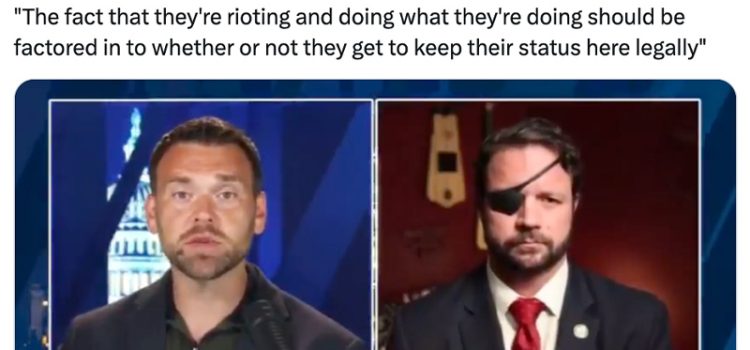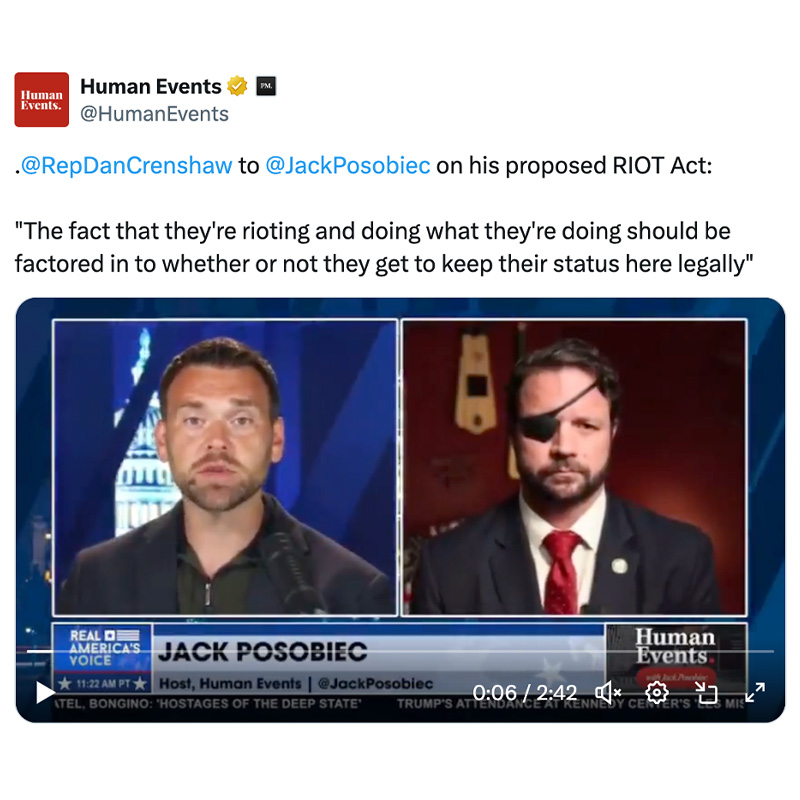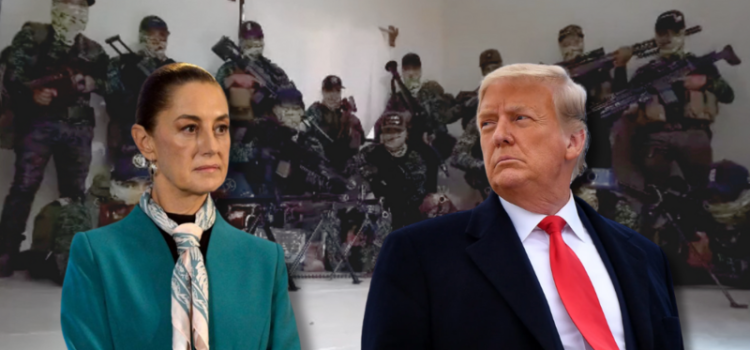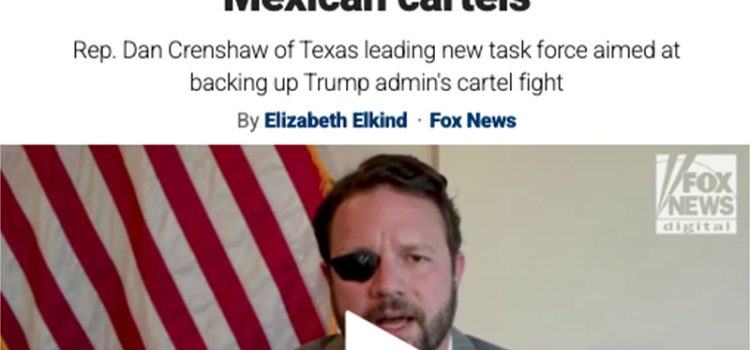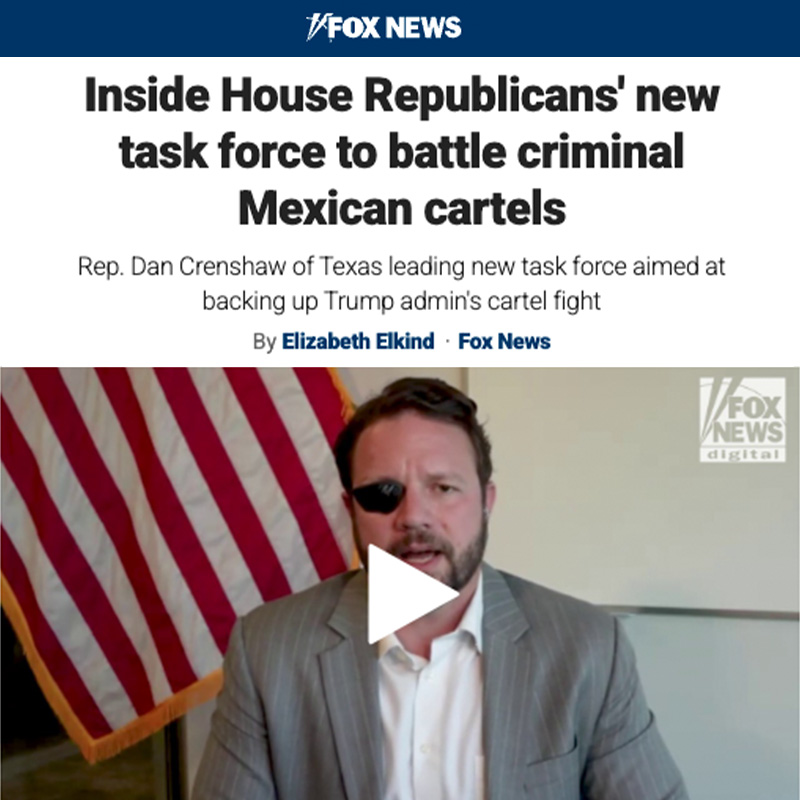WATCH DAN CRENSHAW ON DISINCENTIVIZING IMMIGRANT RIOTS
The war on drugs is now a counter-insurgency war. The Mexican cartels no longer resemble their origins as criminal drug traffickers, but that of a terrorist insurgency, and we need a strategy alongside the Mexican government to win this war.
I call this strategy the North American Security Initiative, and the stakes could not be higher. Tens of thousands of American lives depend on our success, as does the future stability of North America. The United States simply cannot allow Mexico, our neighbor and largest trading partner, to devolve into a failed narco-state.
Cartels have infiltrated every level of Mexican society, from the private sector to government to pop culture. They use terrorist tactics to suppress dissent and destabilize governments. They have effectively conquered regions of Mexico. They enact insidious propaganda and recruitment strategies, while their paramilitary arms rival the capabilities of the Mexican government. This insurgent-like behavior necessitates a counter-insurgency doctrine.
In 2000, we began “Plan Colombia,” providing Colombians with the resources—military equipment, training, and intelligence—to defeat the enemy within. The results? Massive improvements in Colombia over the past 20 years, going from a near-failed narco-state to the relatively safe and prosperous tourist destination it is today. I can speak from personal experience, having lived in Colombia from 1998-2002 during the height of the guerilla insurgency. But modern Mexico has a far deadlier cartel problem, and their historic reluctance to accept US assistance has allowed the problem to fester.
So, what does a counter-insurgency doctrine in Mexico look like? Put simply, it requires the integration of military, intelligence, law enforcement, judicial, and diplomatic strategies.
The Mexicans are outgunned, for starters. We (Congress) need to authorize additional Presidential Drawdown Authority to properly arm the Mexican military—Black Hawk helicopters, close air support aircraft, and ISR (Intelligence, Surveillance, and Reconnaissance) capabilities, to name a few. We must develop a plan to train, at scale, Mexican special forces units and seek permissions from the Mexican government for our Special Forces to operate alongside these units, along with strong oversight to mitigate historic issues of corruption.
But this isn’t solely a military operation. There are critical judicial and law enforcement elements. Unfortunately, the Mexican judicial system is incompetent and often corrupt (though it has improved already under President Sheinbaum). This is where existing programs within Homeland, the DOJ, Treasury, and the FBI must be bolstered—we can offer training for judges, prosecutors, and police officers, as well as provide technical assistance for anti-corruption initiatives. And we must hit the cartels where it hurts the most: their pocketbook.
Intelligence sharing is currently stronger than many realize and has led to some great success in recent months. Contrary to past Mexican administrations, the Sheinbaum national security team led by Secretary Omar Harfuch (himself a victim of an assassination attempt by the Jalisco cartel) has been relentless in their pursuit of cartel networks.
Fighting an insurgency requires network targeting, which means pursuing middle management as well as the “kingpins.” Sometimes you get more strategic benefit by arresting an irreplaceable money broker than a replaceable cartel boss. My amendment signed into law last year created long overdue changes to FISA collection capabilities, thus enabling new collection against the cartels that are just now coming to fruition. But more intelligence resources on the ground and in the air are needed.
Fundamentally, counter-insurgency doctrine will mean the US assisting Mexican federal forces inside cartel-held territories with two basic missions: target the cartels and bolster the local and state police that are overwhelmed and outgunned. Are the local authorities often corrupt? Of course. But do they have choice? They live in the reality of “plata o plomo,” translated to “lead or money.” Fighting an insurgency means changing this dynamic.
Whether we like it or not, we are already engaged in a counter-insurgency war against an increasingly dangerous enemy. And worse, we are currently operating without a coherent strategy.
But the good news is that we finally have an opportunity to change that. President Trump has made it clear this will be a priority. And for the first time in many years, the Mexican government is a willing partner. We must not let this opportunity go to waste.
This oped by Dan Crenshaw originally appeared in Human Events
